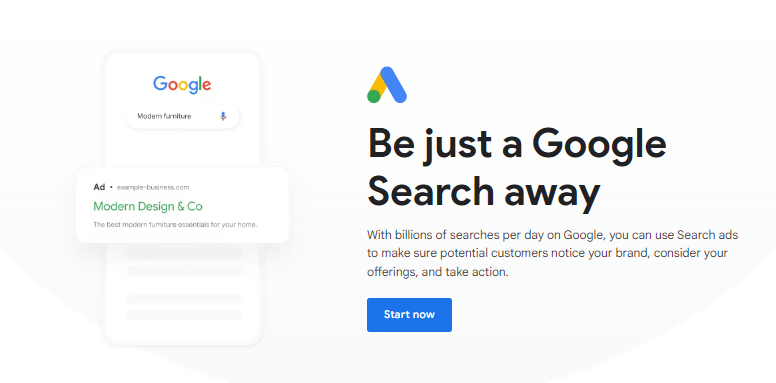December 5, 2024
Google Search Advertising Fundamentals for Success

Greg Kopyltsov
Founder
google search advertising


In today's digital age, businesses need to establish a strong online presence to thrive. Search engine marketing (SEM) and effective search engine optimization (SEO) play a vital role, and Google Ads stands as a prominent platform in this domain. By leveraging Google Ads, businesses can display targeted advertisements within Google's search results, connecting with potential customers actively seeking products or services like theirs.
This form of advertising operates on a pay-per-click (PPC) model, meaning businesses are charged only when a user clicks on their ad. Imagine you have an online store selling handmade jewelry. With Google Search Ads, you can bid on relevant keywords like "handmade earrings" or "silver pendant necklace."
When a user searches for these terms, your ad might appear at the top or bottom of the search results page. If the user finds your display ads compelling and clicks on it, you pay a small fee. This approach enables highly targeted advertising, ensuring that your display URL helps you reach the most qualified audience for your offerings.
Google Search Ads serves as a cornerstone of digital marketing strategies worldwide. In a digital landscape saturated with information, it's becoming increasingly challenging for businesses to capture the attention of their target audience. Google Search Ads offer unparalleled visibility, ensuring your message reaches the right people at the right time.
When a user searches on Google, the displayed results are influenced by various factors, primarily ad rank. Ad Rank determines the position of your ad on the Search Engine Result Pages (SERP), including the effectiveness of responsive search ads. It considers your bid amount, Quality Score (which reflects the relevance and usefulness of your ad and website), ad extensions (additional information like phone numbers and site links), and the context of the search.
A higher ad rank leads to better ad positions and increased visibility. This prominence on the search results page drives more clicks, website traffic and ultimately, conversions. Hence, Google Search Ads play a crucial role in amplifying your brand's reach and driving tangible business outcomes.
Google Search Ads operate on a sophisticated system called the ad auction, which occurs every time a user performs a search. Let's break down the process. First, you create a Google Ads account and set up a search campaign, defining your target audience, budget, and bidding strategy.
Then, you choose relevant keywords that align with your business and create compelling ad copy that entices users to click. When a user’s search matches your chosen keywords, your ad enters the auction.
Finally, Google determines the winner of the ad auction based on a combination of your bid amount and Quality Score. The higher your ad rank, the better your ad position on the search results page. This dynamic auction process ensures a level playing field for businesses of all sizes, enabling them to compete for visibility and connect with their desired customers.
The foundation of successful Google Search Ads lies in their effectiveness. It's not simply about appearing on the search results page— it's about capturing attention, sparking interest, and compelling users to click through to your website. This is where the art and science of crafting effective ads come into play.
It's about understanding your target audience, identifying their needs, and tailoring your message to resonate with them. A well-crafted ad is a blend of compelling ad copy, strategic keyword targeting, and a seamless user experience that guides potential customers towards their desired action.
One of the cornerstones of successful Google Search Ads is selecting the right keywords for your ad group, including the broad match type. Keywords are the search terms that users enter into Google when looking for information, products, or services. Effective keyword research is essential for ensuring that your ads appear in front of the right audience at the right time.
Begin by brainstorming a list of relevant keywords that potential customers might use to find businesses like yours. Utilize keyword research tools to expand your list with related terms and identify high-volume keywords. Consider the intent behind each keyword.
Additionally, don't forget about negative keywords. These are terms that you exclude from your campaigns to prevent your ads from showing to users who are unlikely to convert. For instance, if you sell high-end jewelry, you might add negative keywords like "cheap" or "discount" to ensure your ads are shown to users seeking quality over affordability.
Your ad copy is your chance to make a lasting impression and entice users to click. It's the first interaction potential customers have with your brand, so it's crucial to craft ad text that is not only relevant but also engaging and persuasive.
A high-performing ad copy is clear, concise and compelling. It speaks directly to your target audience, addressing their pain points or aspirations. Incorporate keywords naturally within your ad text, highlighting the value proposition of your product or services. Here are a few tips to enhance your ad copy:
Once you’ve crafted compelling ads and selected relevant keywords, it’s time to turn your attention to optimization. The Google Ads platform offers a wealth of data and insights that can be leveraged to refine your campaigns and maximize your return on ad spend.
Regularly monitor your campaigns by analyzing key performance indicators (KPIs) such as click-through rates (CTR), conversion rates and cost-per-acquisition (CPA). This data empowers you to identify areas for improvement, whether it's adjusting your bidding strategies, refining your targeting or A/B testing different ad variations.
Quality Score plays a pivotal role in determining the success of your Google Search Ads campaigns. Assigned to every keyword in your account, it reflects the relevance and usefulness of your ads and landing pages to users searching for those terms. SEM platforms assess a variety of factors, and achieving high quality scores translates to better ad positions, lower costs, and increased visibility.
Conversely, low Quality Scores can harm your campaign’s performance, leading to higher costs per click and reduced ad visibility. Google considers multiple factors when calculating Quality Score, including:
Consider the following table to understand the correlation between Quality Score and estimated first-page bid:
The continuous pursuit of a better Quality Score is integral for maintaining a healthy and efficient Google Ads account. By striving for higher Quality Scores, you'll unlock lower costs, better ad positions, and ultimately, a higher return on investment.
Focus on crafting highly relevant and engaging ad copy that speaks directly to the users' search intent. Incorporate relevant keywords naturally within your ad text, including app-related terms, ensuring a consistent message between your ad, keywords, and landing page. Optimize your landing pages for conversions by making them user-friendly, mobile-responsive, and ensuring a seamless alignment with the promises made in your ad copy.
Regularly analyze your campaigns and identify keywords with low Quality Scores, considering whether to pause them or refine their associated ad copy and landing pages. Implement these best practices to elevate your Quality Scores and watch your campaigns flourish with improved performance and substantial cost savings.
KeywordSearch has an AI Audience builder that helps you create the best ad audiences for YouTube & Google ads in seconds. In a just a few clicks, our AI algorithm analyzes your business, audience data, uncovers hidden patterns, and identifies the most relevant and high-performing audiences for your Google & YouTube Ad campaigns.
You can also use KeywordSearch to Discover the Best Keywords to rank your YouTube Videos, Websites with SEO & Even Discover Keywords for Google & YouTube Ads.
If you’re looking to SuperCharge Your Ad Audiences with AI - Sign up for KeywordSearch.com for a 5 Day Free Trial Today!
In conclusion, mastering Google Search Advertising is essential for digital marketing success. Crafting effective ads with the right keywords and compelling copy can significantly boost your click-through rates. Optimizing your ad performance by focusing on quality scores and implementing strategies to improve them is crucial for a successful campaign. Understanding the fundamentals of Google Search Advertising and continuously refining your strategies will lead to improved results and better ROI. Stay updated with the latest trends and techniques to stay ahead in the ever-evolving world of online advertising.
Getting started with Google Search Ads is simpler than you might think. Create a Google Ads account, set a budget, and craft your first search campaign. Target your desired audience, create compelling ad copy, and watch as your business attracts new customers.
There’s no fixed budget for a beginner's Google Search Ads campaign. Costs vary based on factors like industry competition, keywords, and bidding strategy. Start with a manageable budget, experiment to understand average cost-per-click (CPC) and gradually scale as your campaigns gain traction.